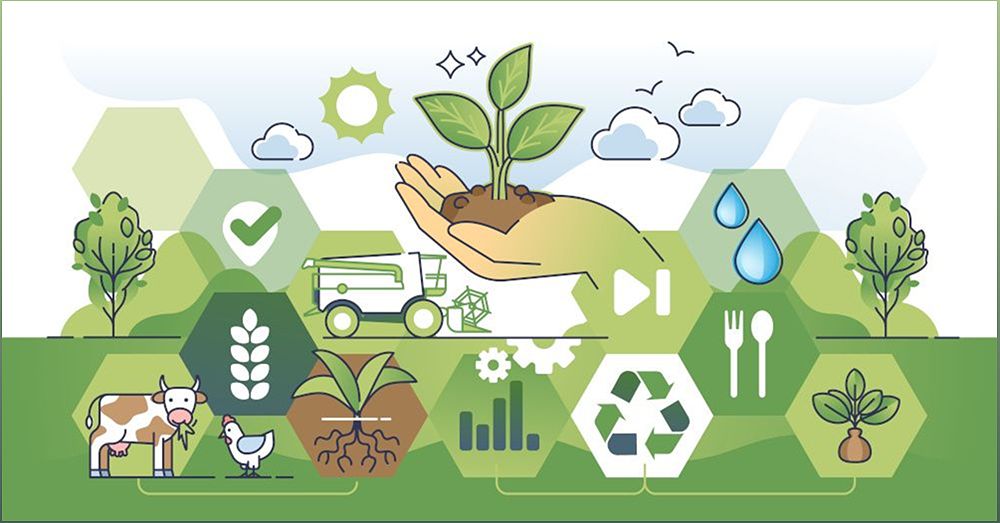Learn about regenerative agriculture and how it offers a holistic approach to sustainable food production, considering factors such as biodiversity, soil health, and water quality. Discover how companies like Cargill and ADM are supporting farmers in transitioning to regenerative practices.
Understanding Regenerative Agriculture: A Holistic Approach to Sustainable Food Production
In today’s world, where sustainability is gaining recognition, the topic of sustainable food production has become increasingly important. However, many consumers and food producers still struggle to fully understand what sustainable food production entails. This lack of understanding can have detrimental effects on our planet and its population. It is crucial for us to explore and comprehend the various tools available to us, including regenerative and organic agriculture.

( Credit to: Nutritionaloutlook )
The growing concern among consumers about the environmental impact of food production has led to a greater appreciation for sustainable food systems. Michelle French, the director of global sustainability programs at ADM, highlights that consumers now recognize the link between food production and issues such as soil and water quality, biodiversity, and greenhouse gas emissions. As a result, they are demanding action from food, drink, and supplement brands to protect the planet. According to a report by FMCG Gurus, 66% of global consumers believe that these brands should do more for sustainability, and 63% actively research the sustainability pledges made by companies.
To meet these consumer expectations, brands need to ensure that their ingredients meet the highest standards of responsible production. Organic certification has long been regarded as the gold standard in sustainable food production. Consumers have embraced organic certification as an indicator of safety and healthfulness. However, Ann Armbrecht, the director of the Sustainable Herbs Program at the American Botanical Council, notes that organic certification has primarily focused on avoiding synthetic chemicals rather than considering the overall health of the farm. While reducing chemical inputs is important, regenerative agriculture offers a more holistic approach.
The Principles of Regenerative Agriculture: A Comprehensive Approach to Farming
Regenerative agriculture extends the principles of organic farming by considering the impacts of farming on the entire ecosystem. It takes into account factors such as biodiversity, soil health, water quality, and farmer and farmworker treatment. By implementing practices such as cover cropping, crop rotation, and reduced tillage, regenerative farming aims to foster ecological balance and resilience. This approach goes beyond simply reducing chemical inputs and focuses on building healthy soil, reducing greenhouse gas emissions, improving water quality, and increasing productivity.
Regenerative agriculture has the potential to benefit farmers, companies, and food production as a whole. It allows us to feed a growing population while promoting environmental sustainability. Companies like Cargill and ADM have recognized the importance of regenerative agriculture and have implemented programs to support farmers in transitioning to regenerative practices.
Cargill’s RegenConnect program provides technical and financial support to farmers as they adopt regenerative practices. The program acknowledges that every farm is unique and tailors its approach to meet the specific needs of each farmer. Similarly, ADM’s re:generations program incentivizes farmers to implement regenerative practices by removing barriers and providing ongoing support.
The Benefits of Regenerative Agriculture: A Win-Win for Farmers and the Environment
The benefits of regenerative agriculture extend beyond the environment. A study conducted by Cargill and the Soil Health Institute found that investments in soil health practices increased net income for the majority of farmers, while also reducing costs and increasing crop resilience and yields. This demonstrates the potential for both economic and environmental benefits for farmers who embrace regenerative practices.
In conclusion, regenerative agriculture offers a proactive and holistic approach to sustainable food production. By considering the health of the entire ecosystem and implementing regenerative practices, we can build resilient agricultural systems that benefit both farmers and the planet. As consumers become more conscious of the environmental impact of their food choices, it is crucial for brands and producers to embrace regenerative agriculture and meet the growing demand for sustainable options.
